The ABC’s of Affiliate Marketing (Terms You Need to Know)
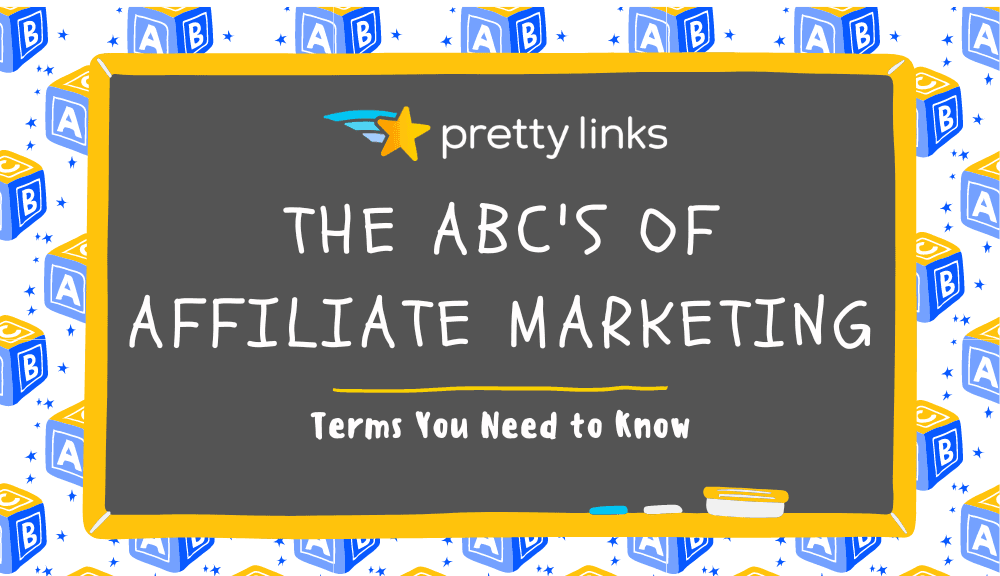
Ready to give affiliate marketing a try, but feeling a tad overwhelmed by all the technical talk?
Fear not! We've got your back with what we like to call, the ultimate affiliate marketing dictionary. It's like the cool cheat sheet you wished you had for that tough class back in high school. Think of this guide as your nerdy friend who breaks down all the complicated lingo into fun-sized, digestible bits.
Ever scratched your head wondering about the science behind “split testing”? Or maybe you've heard folks raving about “finding your niche” and suspected it's the online equivalent of hunting for unicorns?
We're here to clear all that up!
We'll break down the commonly used terms in affiliate marketing, making sure you get a clear understanding of each one.
Let’s kick this lesson off by defining the affiliate marketing process itself!
A is for Affiliate Marketing
Affiliate marketing is a performance-based marketing strategy where affiliates (that’s you) promote products or services for businesses and earn commissions on successful sales generated through your affiliate links.
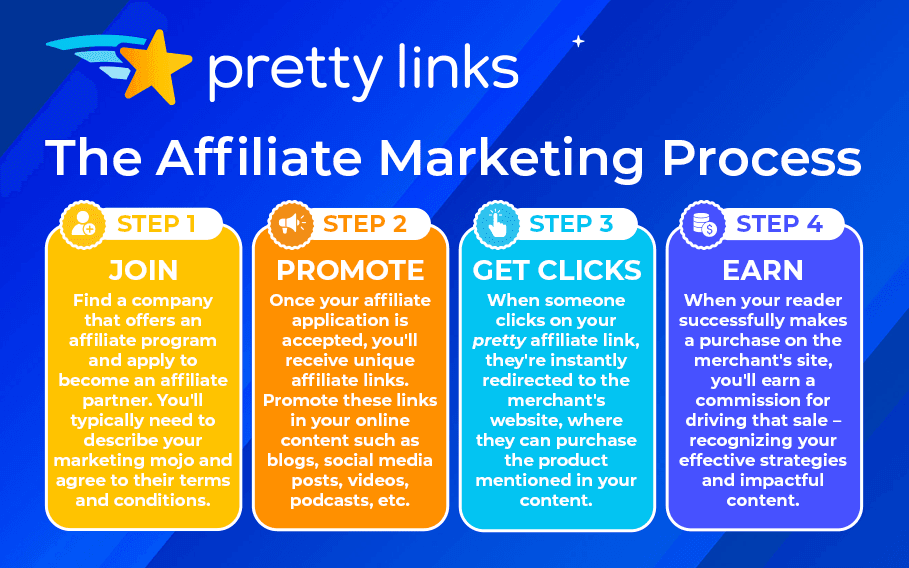
An affiliate link is a special type of URL used by marketers to promote products or services. It contains a unique identifier that helps businesses track referrals and attribute sales back to you, the affiliate marketer.
B is for Blog
Blogging is the ultimate platform for affiliate marketers to incorporate affiliate links into their content. It's the perfect space to seamlessly weave links into engaging articles, captivating product reviews, helpful how-to tutorials, listicle lineups, and more.
The true masters of blogging establish themselves as experts in their niches by consistently providing valuable and trustworthy information.
As readers grow to rely on your recommendations, the persuasive effect kicks in, and they become more likely to make a purchase.
C is for Commission
Commission is the sweet reward affiliate marketers earn for successfully guiding customers to a merchant's product or service through their affiliate links.
There are several types of commissions affiliates can earn, such as:
- Pay-Per-Sale (PPS) or Cost-Per-Sale (CPS): Affiliates earn a percentage or fixed amount for each sale made through their links. This is the most popular commission structure, rewarding affiliates directly for generating successful sales.
- Pay-Per-Lead (PPL) or Cost-Per-Lead (CPL): Affiliates earn for generating qualified leads, such as users signing up for newsletters or submitting forms. This commission structure focuses on driving potential customers to take specific actions beyond making a purchase.
- Pay-Per-Action (PPA) or Cost-Per-Action (CPA): Affiliates earn for specific user actions, such as making a purchase, signing up, or subscribing. This type of commission combines elements of both PPS and PPL structures, rewarding affiliates for a range of desired actions beyond sales alone.
- Pay-Per-Click (PPC) or Cost-Per-Click (CPC): Affiliates earn based on the number of clicks their links receive, regardless of whether a sale or lead occurs. While less common, this commission structure compensates affiliates for driving traffic and attracting clicks.
- Tiered Commissions: Some affiliate programs offer tiered commission structures where affiliates earn different rates based on their performance. Affiliates who generate higher sales volumes or refer more customers can unlock higher commission rates as a reward.
By earning a commission, you reap the rewards of your efforts while helping customers discover amazing products and services.
D is for Demographics
Demographics refer to the juicy characteristics of your target audience, such as their age, gender, location, income level, interests, etc.
By collecting and analyzing demographic data, you gain insights into who your potential customers are and what drives their purchasing decisions. This information helps you create targeted campaigns that resonate with your audience on a deeper level:
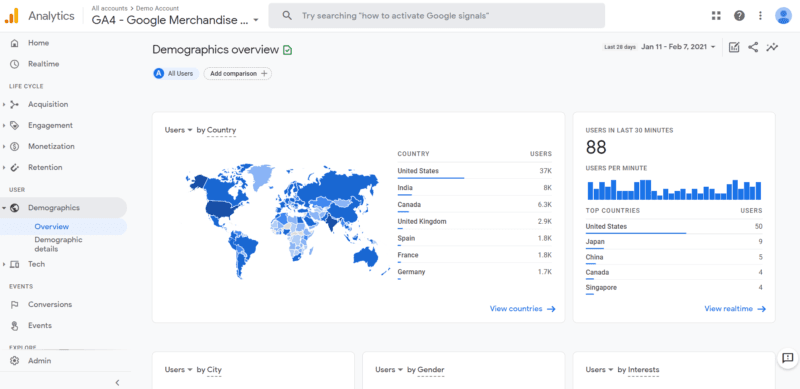
So instead of taking a one-size-fits-all approach, you can customize your messaging and promotions to align with the preferences and needs of different demographic segments.
E is for Evergreen Content
Evergreen content is the kind of content that remains relevant and valuable over a long period, consistently attracting traffic and generating sweet affiliate income streams.
Unlike trendy topics that come and go like a summer breeze, evergreen content stands strong throughout the seasons. It's like a timeless masterpiece that continues to captivate and convert, even long after it's been created.
F is for the Federal Trade Commission
The Federal Trade Commission (FTC) is the guardian of transparency and fair practices in the United States, enforcing laws that protect consumers from deceptive advertising and ensure affiliate marketers follow advertising regulations.
One heavily enforced FTC regulation requires affiliates to provide an affiliate disclosure. This disclosure is a statement affiliates must provide to disclose their relationship with the products or services they promote. It also includes information about their potential earnings from affiliate commissions.
Here’s an affiliate disclosure example:
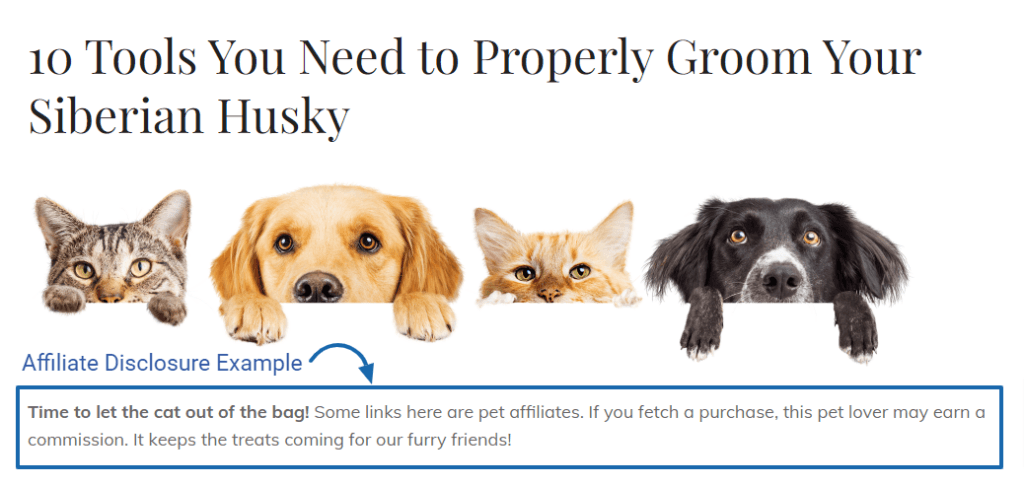
In a nutshell, the FTC keeps a watchful eye over the affiliate marketing world, ensuring that consumers are well-informed and protected from misleading practices, and that affiliates comply with the rules by making proper disclosures about their affiliations and potential earnings.
G is for Geo-Targeting
Geo-targeting is a nifty technique used in affiliate marketing to customize promotions and offers based on specific geographic locations.
With Pretty Links, affiliates can create customized geo-targeted links that automatically redirect users to different destinations depending on their geographic location.
For example, say you're an affiliate marketer for Amazon. With geo-targeted Pretty Link redirects, you can create a customized link for visitors from the United States. When they click on the link, they'll be whisked away to the Amazon.com website.
Say you also have shoppers on your site from the United Kingdom. You can create another Pretty Link specifically for them too. When they click on the link, they'll be seamlessly redirected to the Amazon.co.uk website:
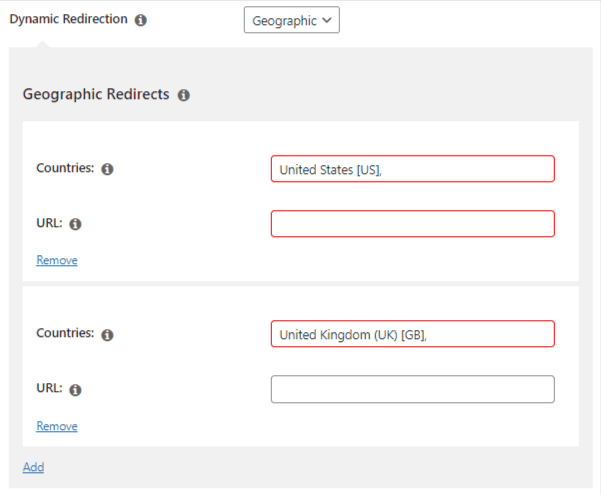
With geo-targeting, you're providing a localized and personalized shopping experience for each visitor. Users from different countries get access to products and services tailored to their region and local currency.
H is for Home-Based Business
A home-based affiliate is an affiliate marketer who runs their business right from the cozy confines of their home. They have the freedom to work remotely, allowing them to manage their affiliate marketing efforts on their own terms.
Being a home-based affiliate offers numerous benefits. First and foremost, it provides the flexibility to create your own schedule and work from the comfort of your home – or whatever environment that suits your productivity and creativity.

Additionally, as a home-based affiliate, you have the freedom to craft your own work style. You can experiment with different strategies, explore new niches, and adapt your marketing efforts based on your unique preferences and interests.
I is for Influencer
An influencer wields the power of a massive online following and has the ability to sway the purchasing decisions of their audience. They're like modern-day trendsetters with an army of loyal followers at their fingertips.
With their magnetic personalities and engaging content, influencers become the go-to authorities for fashion, beauty, travel, fitness, and so much more.
Brands recognize their influence and often join forces with them as affiliates to spread the word about their products or services.
J is for Javascript
JavaScript and Meta-Refresh are two types of redirection methods that serve a similar purpose. They allow you to specify a time delay before redirecting visitors to another web page.
If you have enabled the Google Analytics integration option in Pretty Links, you can leverage JavaScript redirects to seamlessly incorporate Google Analytics tracking into your affiliate links. This allows you to gather insightful data and analyze the performance of your campaigns more effectively.
However, it's worth noting that some users may have JavaScript disabled in their browsers. In such cases, Meta-Refresh can be a viable alternative for redirection.
K is for Keyword
Keywords are the heart and soul of optimizing your content for search engine optimization (SEO). These carefully selected words or phrases act as shining stars, guiding search engines to understand the essence of your content.
By seamlessly incorporating relevant keywords into your web copy, you enhance the likelihood of your content appearing at the top of search engine result pages (SERPs) when users search for related terms.
This powerful connection between keywords and search engine algorithms attracts valuable organic traffic to your website, giving your content the visibility it deserves.
In the ever-evolving realm of SEO, conducting regular keyword research is paramount. This involves identifying popular and relevant keywords that resonate with your target audience, evaluating their competition, and adapting your content strategy accordingly.
L is for Link Cloaking
Link cloaking is a smart technique used by affiliate marketers to transform lengthy affiliate links into sleek, user-friendly URLs through the art of link shortening.
But here's the real magic: link cloaking also acts as a disguise to shield affiliate links from the clutches of link hijackers and thieves. By concealing the true nature of the affiliate link, marketers safeguard their commissions against any malicious attempts to redirect or steal them:
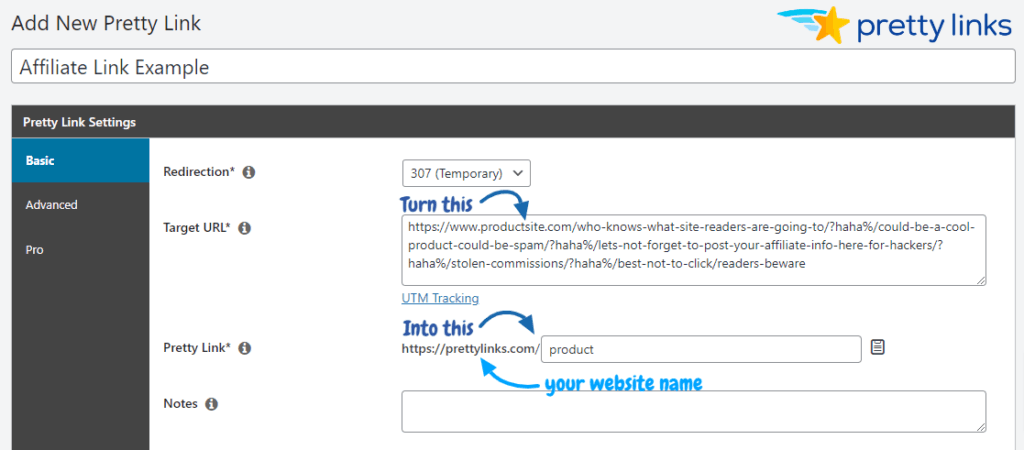
Remember: Link cloaking should always be implemented ethically and transparently. it’s essential to disclose to users that the link they are clicking is an affiliate link, ensuring transparency and compliance with applicable regulations.
With careful implementation and ethical practices, affiliate marketers can create visually appealing and secure URLs that resonate with their audience and protect their hard-earned commissions.
M is for Merchant
We already covered who you are as an affiliate, now let’s talk about the remarkable individuals or companies you work for, commonly known as merchants.
Merchants come in all shapes and sizes. They can be giant corporations like Apple, ruling the global market, or they can be as small as your friend's jewelry-making business that she operates out of her basement.
Merchants create and maintain their own affiliate programs to outline the terms, commission structures, and guidelines for affiliates such as yourself who join in promoting their offerings.
By creating these programs, merchants open the doors to collaboration and leverage affiliate marketing to expand their reach, connect with audiences they may not have otherwise reached, and ultimately boost sales.
As an affiliate, it's important to understand the merchant behind the products or services you promote. They are the creators and owners, and they rely on your marketing skills and reach to propel their offerings to new heights.
Together, you form a powerful alliance, meeting consumer needs in the vast world of ecommerce.
N is for Niche
A niche is that special spot in the market where affiliate marketers become matchmakers, connecting the right products to the right audience.
As an affiliate marketer, your niche becomes your creative playground. You could set your sights on a broad niche like “dog grooming,” or you could narrow it down to something more specific, such as “coat care for Siberian Huskies”.
Once you've found your niche, it's time to bring your expertise to the table and cater to the unique needs and desires of your audience. You become the go-to guru who recommends and delivers exactly what your audience craves.
O is for Organic Traffic
Organic traffic refers to your new online friends who found their way to your site naturally, without the use of paid advertising.
Here are some common ways you can direct more organic traffic to your affiliate site:
- Search Engine Traffic. When users stumble upon your website while searching on search engines like Google, Bing, or Yahoo, that's because your site pops up for the relevant keywords or phrases they're searching for. In other words: you become the answer to their online quests.
- Content Marketing. With top-notch content, you become an irresistible force that pulls people toward your site. They're captivated by your valuable insights, and they can't help but dive deeper into your content. As they explore, those enticing affiliate links come into play, tempting them to click and discover the amazing products or services you're promoting.
- Social Media Traffic. Fire up those organic posts, shares, and incredible engagement on platforms like Facebook, Instagram, Twitter, LinkedIn, or Pinterest. These become your traffic boosters, bringing waves of visitors to your affiliate promotions.
- Email Marketing: Get those subscribers who are eager to hear from you in their inbox. When you have a list of people interested in your niche, send them regular newsletters or targeted email campaigns, promoting your awesome affiliate products or services. It's like having your own VIP group who can't wait to see what you have in store for them.
Forget paid advertising for a sec and focus on the power of organic traffic. With smart strategies like search engine optimization, killer content, social media mastery, and email wizardry, you'll attract and engage your audience in an organic way.
P is for Product Displays
Product displays are mesmerizing showcases that capture attention and make products shine. They're expertly crafted to present merchandise in the most captivating and enticing way possible.
With the Pretty Links Product Display Add-on, you have the power to seamlessly integrate stunning product displays right within your blog posts. You can customize every aspect, from the layout to the colors and personalized call-to-action buttons, to create a visually appealing experience that reflects your unique style and brand:
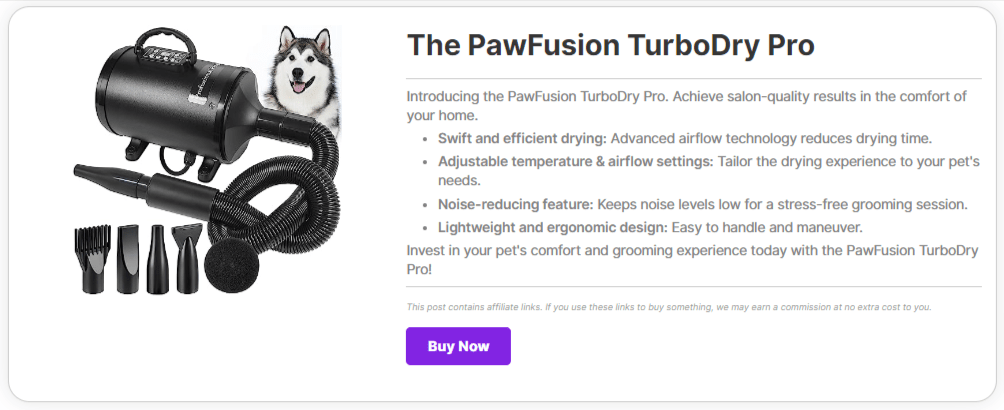
By showcasing your affiliate products within your blog posts, you create a dynamic and immersive environment for your readers. They can explore and engage with the products you recommend, all without leaving your site. It's like bringing the store directly to them!
Q is for QR Code
A QR code is a special kind of barcode, shaped like a square, that holds the power to let people in your website.
When someone uses their smartphone to scan your QR code, they’re instantly transported to the specific content you want to share with more information:

Pretty Links makes it super easy for you to create your own QR codes. With just 1-click, you can generate a unique QR code for any pretty link you create. Then slap those things all over the place, like on business cards, flyers, product packaging, or even the back of your cat (just kidding, don’t do that).
Incorporating QR codes into your marketing strategy can expand your reach, increase brand visibility, and attract more visitors to your online content. It's a smart and efficient way to engage with your audience and make it easier for them to access the information you have to offer.
R is for Recurring Revenue
Recurring revenue is like the gift that keeps on giving in the world of affiliate marketing. It's the sweet sound of cha-ching that keeps coming in on a regular basis, giving you a steady stream of income that just won't quit.
Unlike one-time commissions, recurring revenue allows affiliates to enjoy ongoing earnings from their referred customers. This creates a more stable and predictable income stream, giving affiliates a sense of financial security and the opportunity for long-term growth.
One of the most common examples of recurring revenue in affiliate marketing is through membership programs or subscription-based services. When affiliates refer customers who sign up for a monthly or yearly subscription, they continue to earn commissions for as long as those customers remain subscribed.
To tap into recurring revenue opportunities, affiliates should seek out affiliate programs that offer subscription-based products or services, such as email marketing tools.
S is for Split Testing
Split testing, also known as A/B testing, is like having your own secret laboratory where you conduct exciting experiments to optimize your strategies and supercharge your success.
A split test involves creating multiple variations of your marketing elements and comparing their performance. By splitting your audience into different groups and exposing them to different versions, you can gather valuable insights into what resonates with your audience and drives better outcomes.
For example, you can test different headlines, call-to-action buttons, color schemes, or even entire landing pages. By monitoring key metrics like click-through rates, conversion rates, or engagement levels, you can determine which variation performs better and make informed decisions to optimize your campaigns.
Pretty Links takes split testing to the next level. With the Super Affiliate plan, you can create different versions of your links and compare their performance. Test different URLs, anchor texts, or even redirect types to see which variation drives more clicks and conversions.
T is for Link Tracking
Tracking is an essential aspect of affiliate marketing that allows you to monitor and analyze the performance of your campaigns. It involves gathering data and analyzing key metrics to see how your marketing mojo is working.
Pretty Links has top-notch link tracking and reporting tools that allow you to see how your affiliate links are performing. But if you're hungry for more juicy insights, you can level up with the Google Analytics integration.
Google Analytics provides a wide range of metrics to help you understand your website traffic and user behavior. These include metrics like unique views, page views, bounce rate, and more. By diving into these metrics, you can gain valuable insights into how visitors interact with your website and the effectiveness of your affiliate marketing campaigns:
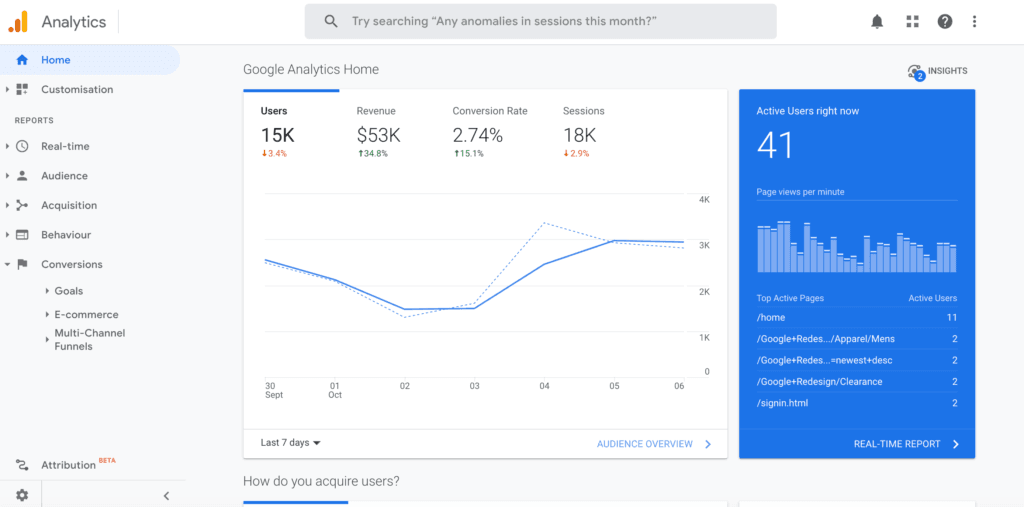
What's even more awesome is, Google Analytics lets you create custom reports tailored to your affiliate marketing goals. You can zoom in on the metrics that matter most to you, getting a laser-focused view of your marketing prowess.
By utilizing link tracking and integrating with Google Analytics, you can gain valuable insights into the effectiveness of your affiliate marketing efforts and make data-driven decisions to optimize your campaigns for better results.
U is for User-Generated Content
You may think as an affiliate marketer that you only have one voice when it comes to promoting products on your site. But you actually have a whole choir that can help skyrocket your commissions: your readers!
Unlock the power of user-generated content (UGC) in your affiliate marketing strategy!
Start by reaching out to your readers, asking them to share their feedback and experiences with the affiliate products you promote. Let them be the star of the show! Then, once you've gathered this valuable user-generated content, it's time to spread the word.
Feature glowing testimonials on your website to build trust and credibility. Share stunning customer photos on your social media platforms to create buzz. And why not create captivating video compilations that showcase the real-life experiences of your satisfied customers?
With UGC as your secret weapon, you can provide social proof that speaks volumes about the value and quality of the affiliate products you endorse.
V is for Vanity URL
Here’s an easy one for you, a vanity URL is simply another word for a short, branded link. It's a special web address that is made to match a specific brand, business, or an affiliate marketer’s identity.
Instead of using a generic web address or a long affiliate link, a vanity URL shortens the slug to only include important details such as the brand name or keywords, making it more catchy and memorable:

But here's the important part: Using a vanity URL doesn't mean that all the important tracking information in an affiliate link disappears. Rather, think of it like wearing a mask.
Affiliates can still keep track of how many people click on their special link and see how well it's working. Merchants can also see who deserves commissions based on the “masked” affiliate link.
Whether you call it a branded link or a vanity URL, the goal is the same: to create a customized and memorable web address that represents your brand and helps attract more attention and engagement from your target audience.
W is for Win-Win
Affiliate marketing is like a never-ending party where everyone gets to have a blast and come out on top. It's a win-win situation that brings joy and benefits to everyone involved.
First and foremost, affiliate marketers are the life of the party. You get to turn your passions and interests into a source of income. Whether you're crazy about fashion, fitness, or tech gadgets, you can promote products you love and earn money in the process.
On the other side of the dance floor, we have the merchants. They have the opportunity to expand their reach and boost their sales through the power of affiliate marketing. By partnering with affiliate marketers, they tap into new audiences and gain exposure for their products.
And let's not forget about the star guests of this party: the consumers. They benefit greatly from affiliate marketing as well. They get access to a wide range of products and recommendations from trusted affiliate marketers. It's like having a personal shopper who curates the best finds just for them.
In this dance of affiliate marketing, everyone wins. It's a celebration of collaboration, where passion meets profit and consumers find exactly what they need.
X is for X-Selling
X- Selling or Cross-selling (okay, so we had to get a little creative on this one) is like being a smooth talker in ecommerce, encouraging readers to purchase additional products that complement their current purchases and enhance their overall experience.
Cross-selling as an affiliate marketer allows you to increase your earnings by recommending additional products and providing more opportunities for readers to click on your affiliate links.
For example, picture a reader scrolling through one of your dog grooming product review articles. This is the perfect moment to employ a clever cross-sell tactic, such as a product display or pop-up, to suggest complementary items like shampoos or stylish accessories to complete the look:
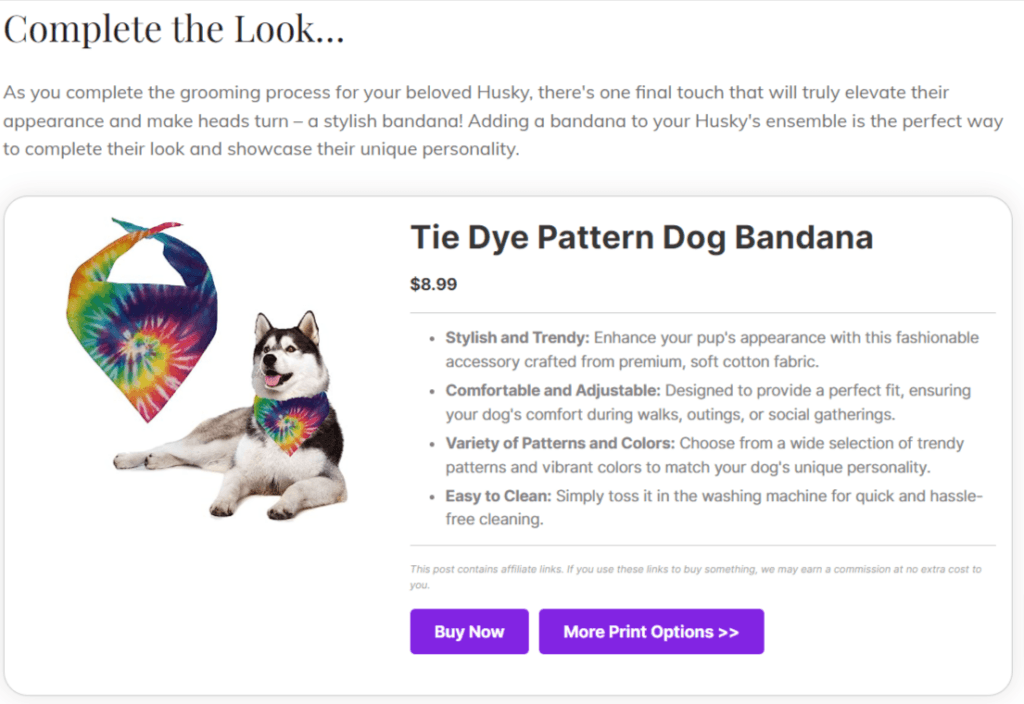
By implementing effective cross-selling practices, you create an interactive and personalized shopping experience for your audience. They feel like you understand their needs and are providing valuable recommendations.
Y is for YouTube Affiliate Marketing
YouTube, the giant of online video sharing, is a playground of endless possibilities for affiliate marketers to showcase and endorse amazing products.
Record captivating content like product reviews, demonstrations, or exciting unboxing events that engage your viewers and inspire them to make purchases.
By seamlessly adding affiliate links to your video descriptions, you provide your audience with a hassle-free way to click through and get their hands on the products you're showcasing.
Say you actually want to give a shout-out to your link live on camera. There’s no way you can spell out an affiliate link that looks like this without getting tongue-tied:
With Pretty Links, you can transform that tricky affiliate link into a short and memorable one that effortlessly rolls off the tongue. These catchy links stick in the minds of your viewers, making it easier for them to remember and type in later.
Z is for Zero Risk
In affiliate marketing, risks are as rare as unicorn sightings. In this magical realm, “Z” stands for Zero Risk, offering you a thrilling and worry-free journey.
As an affiliate marketer, you don't need to invest your own money or take on any financial liability. Unlike traditional business ventures that often require significant upfront costs, affiliates can join affiliate programs for free and start promoting products or services right away.
What's even more exciting is, you have the freedom to choose what you want to promote. Whether it's the latest fashion trends, cutting-edge gadgets, or wellness products, you can follow your passions and share your enthusiasm with others.
So, unleash your inner entrepreneur and embrace the zero-risk nature of affiliate marketing.
Conclusion
In the spirit of our affiliate marketing alphabet, let's wrap up this post to the familiar tune we all know and love:
Now You Know Your ABCs,
Get Started with Pretty Links >>
Time to Unleash Your Marketing Flair,
Show the World You're Ready to Share.
Take What You've Learned, Put it Into Play,
Guaranteed Your Business Will Slay!
Create Your Links, Let Them Shine,
Watch as Your Commissions Climb.
Join the Party, Let's Have Some Fun,
Your Affiliate Journey's Just Begun.
Affiliate Success is Just 1 Click Away,
Let Pretty Links Guide the Way!
Have you encountered any affiliate marketing terms that are leaving you scratching your head? Drop them in the comment section below, and let's tackle them together!
If you liked this article, be sure to follow us on Facebook, Twitter, Pinterest, and LinkedIn! And don't forget to subscribe to our newsletter!